
In July this year, I spent ten days travelling across Georgia.
It was my favourite kind of trip: I had a preordained start and finish point, but where I went and what I did in between was entirely up in the air. I began in Tbilisi, having arrived via minivan from Georgia's southern neighbour Armenia. I left from Kutaisi, a city of admittedly limited initial attraction bar its status as the regional hub for Wizzair, and thus my cheap route onwards to Greece.

Knowing little about Georgia before I arrived, I left clutching a fistful of indelible memories. I was drawn to the country’s raw concentration of culture and social history, brought to life in the tough smiles of laconic shopkeepers across this beautiful, weathered land.
Georgia is another in a string of countries on the outskirts of Europe that I have recently visited that pines fervently for the EU. Unlike the more desperate tone in Bosnia or the edgy complexity of Armenia, in Georgia, there is a sense of quiet achievement. Georgia has recently been selected for future EU membership so long as it meets several economic and governance conditions, but already there is a forest of EU flags flying around Tbilisi.

While I was there, Georgia played host to one-half of the UEFA Men's Euros U-20s. The opportunity wasn't lost on the tournament organisers, and the host cities I visited were decked out in a fervent celebration of the country's European-ness.
Doubtless Georgia’s accelerated European tilt (and the general acceptance of this course by central Western powers) has something to do with the recent actions of Georgia’s rather bellicose northern neighbour. To this end, there was a noisy pro-Ukraine rally outside the Georgian parliament building on the day I arrived in Tbilisi, but it was the more subtle and numerous shows of Ukrainian support in street art and shop windows across Georgia that really caught my eye.
Tbilisi
The opening line of an online guide I read on things to do in Tbilisi declared emphatically "Do not visit between June and August," due to the extreme heat. Unfortunately, this advice came too late, as I had already arrived in the city after a short minivan ride from Yerevan. Having flagrantly disregarded this first dictum, I decided I could go ahead and ignore the other 52 things on their list, which left me with very little to go on.
Not to worry; the city unrolled itself gently over the time I was there, never revealing too much at once or leaving me without something to do.
Two things I knew Georgians shared with New Zealanders: a love of rugby and a love of wine. In the former, I was confident New Zealand had the competitive edge, but I soon found out the latter was a completely different story. I jumped at the opportunity to do a wine tasting while in Tbilisi and opted rather ambitiously for the 9-course option. I was told by the sommelier (so it must be true) that there are 425 different varieties of grapes in Georgia. Many wineries continue the grand old tradition of fermenting grapes in clay pots, producing the amazing flavours which have made Georgian wines famous around the world.
In Tbilisi, grapes grow like grass, spilling out over walled gardens onto the pavement.
Scenes from Tbilisi
Batumi

It should come as no surprise to anyone to learn that the Black Sea is not actually black.
It's lost somewhere between green and grey, never seeming to stay one shade for very long; changing with the tide, the weather, or its mood.
Batumi is known as the Las Vegas of the Caucasus due to its many casinos and giant hotels. However, with its long, wide boulevard along the beachfront, I felt this was a missed opportunity to call it the Atlantic City of the Caucasus instead.
Yes, there is a glut of gleaming glass palaces with glittering gold trim, garish statements of wealth shot high in the sky; monuments of man's indifference to the impossible.
But in between them, there are still a few drab tumble-down apartments that have stuck out their elbows and stood firm to their slice of Black Sea frontage, and as you move inland away from the shadows of looming skyscrapers, humanity begins to return with furniture stores and family grocers and men playing cards on street corners. As I walked these less prominent streets I felt like I was backstage at the Moulin Rouge, watching the dancers remove their makeup and costumes and pick up a cigarette.

Batumi's coast is beautiful. Along the beach, waves make a throaty whoomp as they smash down on large dark pebbles. Watching the sun set into the Black Sea was an irresistible moment: it felt like the sun didn't want to go, clinging on longer than usual to the lip of the sky before relinquishing its grip and turning the night over to the dealers and gamblers, the lucky and the unlucky, the sleepless and the lost.
Scenes from Batumi
Kutaisi

After the scorching heat of Tbilisi and the bright lights of Batumi, Kutaisi's quiet corner cafes were a welcome change and the perfect way to finish my trip. There was an extra level of authenticity to Kutaisi that I loved- nothing felt forced or purely aesthetic.
I spent days walking through parks and eating pastries, without aim or endeavour.
I find I never fully appreciate quiet in its time. It is only when the bustle and noise and chatter arrive that I realise what I enjoyed, how sweet the silence was, with its cosmic limitlessness and endless potential.
In a few short weeks, I would be yearning for those bygone moments, like the simple act of sitting on a park bench opposite the brooding face of a long-dead Georgian forefather and just wondering.
But I did not know this yet. For me, Georgia was a place between places.
I return to it sometimes in pauses, silences, the quiet and the calm. I know I can reach it there, that is where it lies.



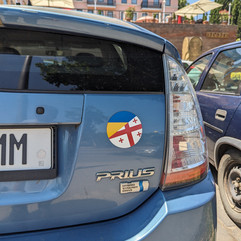



















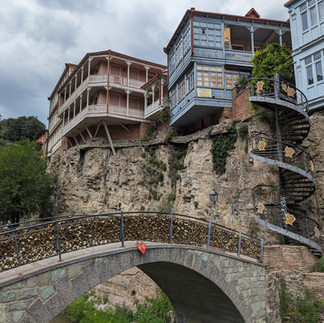

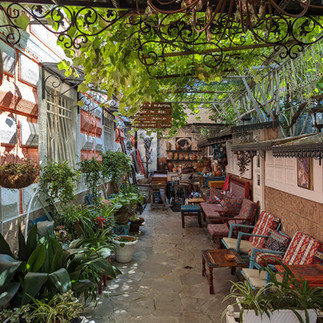

















































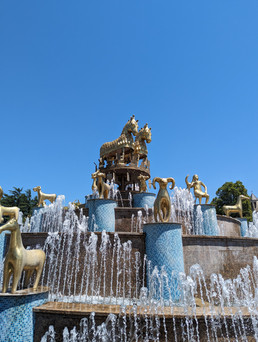





















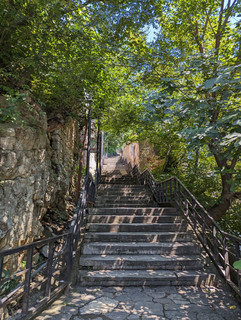







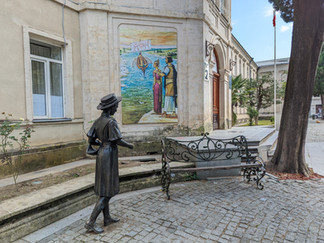
Comments